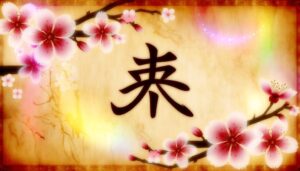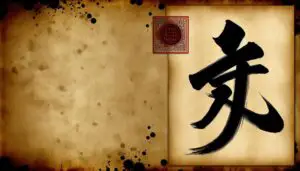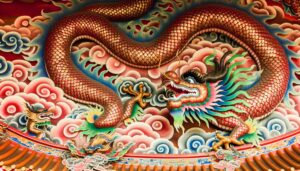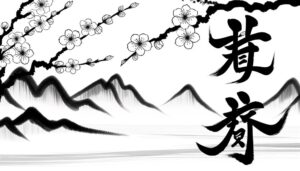Which Animal Represents the Chinese New Year Symbol 2024?
The Chinese New Year for 2024 celebrates the Dragon, a symbol of power, strength, and good fortune. Historically, the Dragon plays a critical role in Chinese culture, embodying authority and auspiciousness.
This year carries expectations for significant personal and societal changes, driven by the Dragon's attributes. Modern celebrations will likely include technologically advanced methods such as AR and VR in traditional dragon dances, blending heritage with innovation.
These events reflect a broader trend of cultural rejuvenation and economic growth. To discover more about how this influential symbol impacts various facets of life and business, continue exploring the topic.
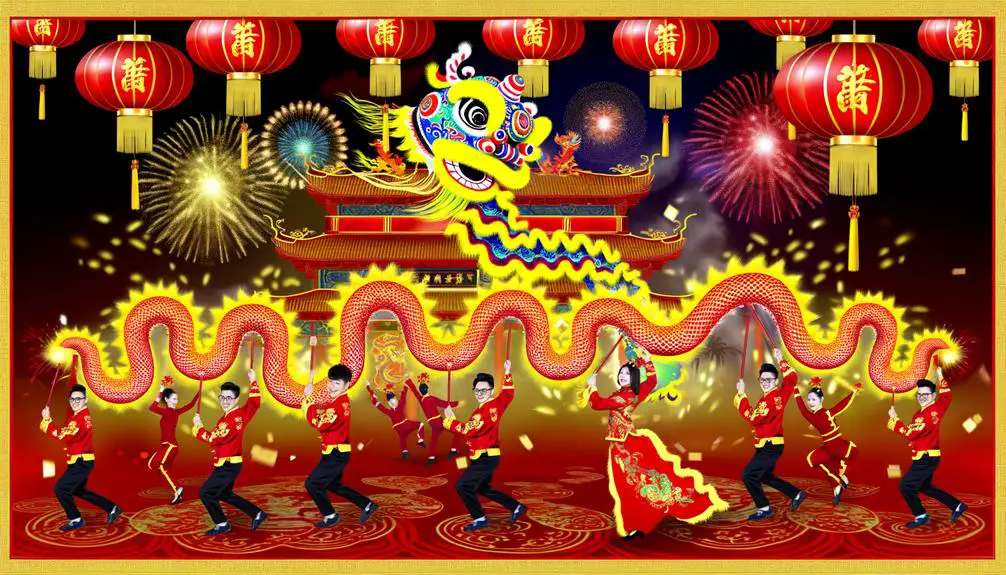
Key Takeaways
- The Chinese New Year symbol for 2024 is the Dragon.
- The Dragon symbolizes power, strength, and good fortune in Chinese culture.
- Celebrations may include modern elements like AR and VR in dragon dance performances.
- Traditional festivities feature dragon parades, fireworks, and cultural rituals.
- The Dragon inspires themes in business ventures and marketing campaigns for the New Year.
Significance of the Dragon
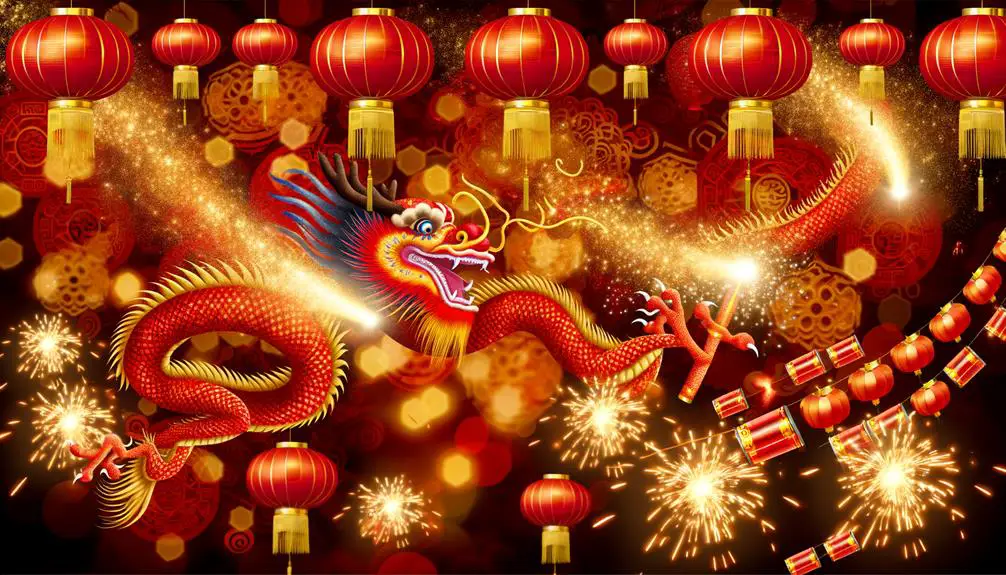
As an emblem of power, strength, and good fortune, the Dragon holds a profound significance in Chinese culture, particularly during the Chinese New Year celebrations. Symbolically, the Dragon is believed to bring prosperity and success, making its presence an essential element in various festivities.
Its depiction through elaborate dragon dances, vibrant decorations, and intricate artwork serves not only as an aesthetic marvel but also as a cultural invocation of positive energy. The Dragon's majestic form, often portrayed with a serpentine body and fearsome visage, encapsulates a multitude of auspicious qualities.
These representations are meticulously crafted to embody resilience, wisdom, and celestial protection, ensuring that each New Year begins with a potent symbol of hope and renewal for the community.
Historical Roots
The historical roots of the Chinese New Year symbol for 2024 can be traced back to ancient traditions that have evolved over millennia. Initially grounded in agricultural practices and lunar calendar observances, these symbols have continually adapted to reflect the cultural values and societal shifts within Chinese history.
Understanding the origins and evolution of these traditions provides essential context to their enduring cultural significance.
Ancient Traditions Origins
Tracing its roots back over 3,000 years, the Chinese New Year, also known as the Spring Festival, has evolved from ancient agricultural practices and traditional lunar calendar observances. Originating during the Shang Dynasty (1600-1046 BCE), this festival was initially tied to agrarian cycles, marking the end of winter and the advent of spring planting. The lunar calendar's significance was paramount, as it dictated the timing of agricultural activities and subsequent celebrations.
Key components of ancient traditions include:
- Ritual sacrifices: Offered to deities and ancestors to guarantee a prosperous harvest.
- Lion dances: Performed to ward off evil spirits and invite good fortune.
- Nian legend: A mythical beast whose defeat symbolizes the victory of light and renewal.
These elements form the foundation of modern celebrations.
Cultural Significance Evolution
Over centuries, the cultural significance of the Chinese New Year has transformed, reflecting shifts in societal values, economic conditions, and political landscapes. Historically rooted in agrarian practices, the festival marked the end of winter and the anticipation of spring, symbolizing renewal and abundance.
With the advent of industrialization and urbanization, its focus expanded to include familial reunions and economic prosperity, emphasizing the importance of kinship and financial success. Politically, the festival has also been a tool for statecraft, fostering national unity and cultural continuity.
Today, global diaspora communities have adapted these traditions, blending ancient customs with modern practices, thereby ensuring the Chinese New Year's relevance in an ever-evolving socio-economic context.
Symbolism in Chinese Culture
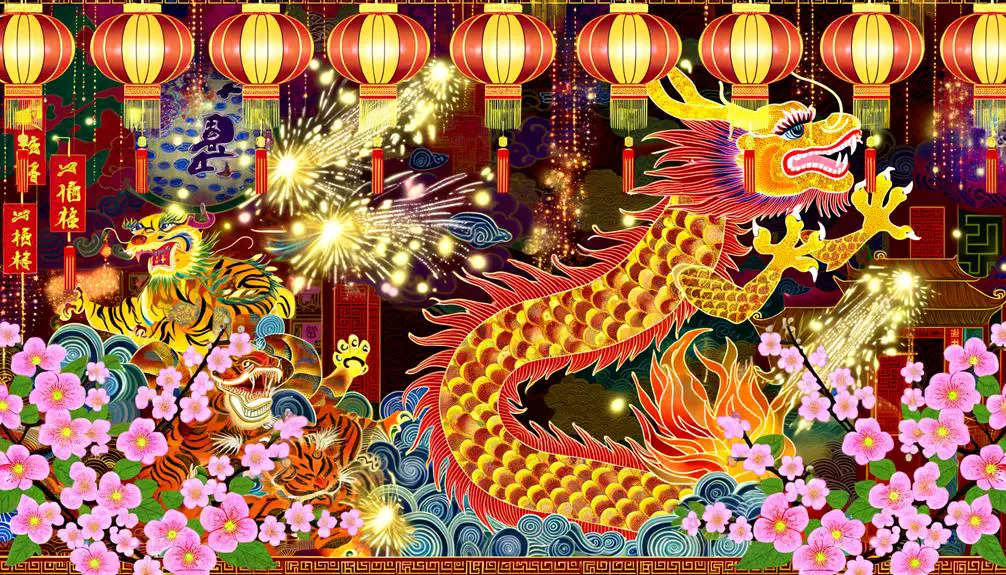
Symbolism in Chinese culture carries profound significance, reflecting core values and beliefs that have been meticulously preserved over centuries.
Traditional symbols, such as dragons, phoenixes, and the twelve zodiac animals, embody meanings ranging from prosperity and longevity to protection and harmony.
Understanding these symbols provides vital insight into their enduring cultural importance and the role they play in festive celebrations like the Chinese New Year.
Cultural Importance of Symbols
In Chinese culture, symbols hold profound significance as they encapsulate centuries of tradition, belief systems, and collective identity. These symbols are more than mere representations; they serve as conduits for the transmission of cultural values and historical narratives. Their application is deeply interwoven into various aspects of life, from art and architecture to daily rituals and festivals.
Historical Continuity: Symbols preserve historical events and cultural milestones, ensuring that knowledge is passed down through generations.
Ritualistic Functions: In ceremonies and festivals, symbols play a key role in invoking auspicious energies and warding off negative influences.
Collective Identity: Shared symbols foster community cohesion, reinforcing a sense of belonging and shared heritage.
Understanding these facets enriches our appreciation of Chinese cultural traditions.
Traditional Symbol Meanings
Building on the profound cultural importance of symbols, traditional Chinese symbolism encompasses a rich tapestry of meanings that are deeply embedded in the cultural psyche. These symbols are not merely decorative but serve as potent representations of values, beliefs, and aspirations. For instance, the dragon signifies power and strength, while the phoenix embodies grace and virtue. Each symbol carries layers of historical and cultural context, enriching the observance of rituals and celebrations such as the Chinese New Year. Below is a table highlighting some key traditional symbols and their meanings:
| Symbol | Meaning |
|---|---|
| Dragon | Power, strength |
| Phoenix | Grace, virtue |
| Peony | Prosperity, honor |
| Fish | Abundance, wealth |
| Bamboo | Resilience, flexibility |
This symbolism enhances the understanding of Chinese culture's depth and intricacies.
Dragon in Modern Times
Despite its ancient origins, the dragon continues to hold significant cultural and symbolic relevance in contemporary Chinese society. The dragon symbolizes power, strength, and good fortune, elements that are deeply ingrained in modern Chinese culture and identity.
Key modern influences of the dragon include:
- Business and Branding: Many Chinese companies incorporate dragon imagery to convey dominance and success.
- Pop Culture: Movies, television shows, and literature frequently depict dragons, reinforcing their mythological importance.
- Festivals and Ceremonies: Dragons remain central in various cultural celebrations, such as dragon boat races and parades.
This enduring symbol seamlessly bridges China's rich historical past with its dynamic present, reflecting an ongoing narrative of resilience and prosperity.
New Year Traditions
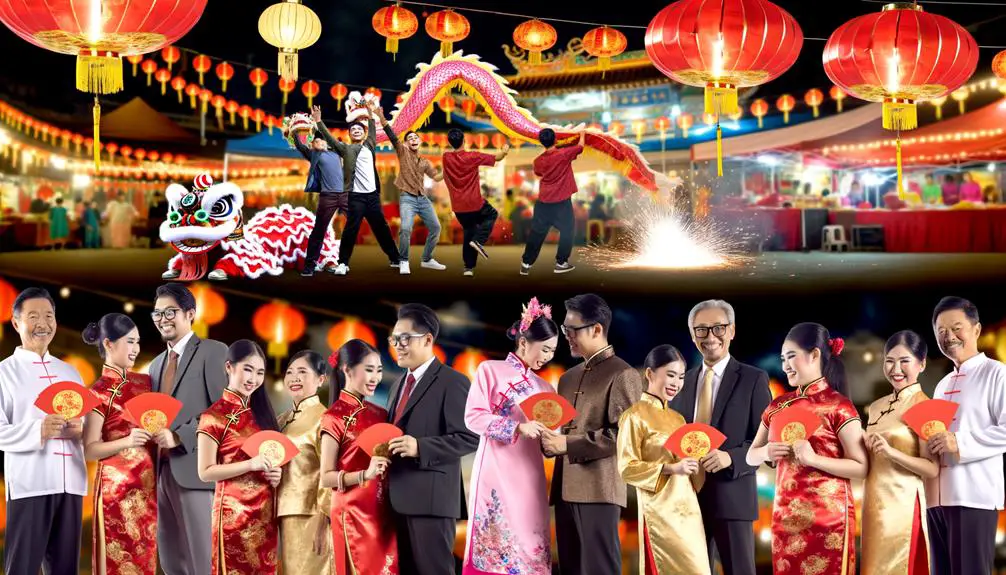
Steeped in centuries-old customs, Chinese New Year traditions encompass a rich tapestry of rituals and practices that reflect the cultural values and historical significance of this auspicious period. These traditions include various activities such as family reunions, elaborate feasts, and symbolic decorations. Each ritual carries a profound meaning aimed at ushering in prosperity, happiness, and protection from evil spirits. The importance of these practices is not merely symbolic but also functional, fostering familial bonds and community cohesion.
| Tradition | Meaning | Practice |
|---|---|---|
| Family Reunion | Unity and togetherness | Large family dinners on New Year's Eve |
| Red Decorations | Good luck and fortune | Hanging red lanterns, banners, and more |
| Lion Dance | Dispelling evil spirits | Performances in public spaces |
| Firecrackers | Scaring away bad luck | Lighting firecrackers at midnight |
| Giving Red Envelopes | Wishing prosperity | Elders give envelopes with money to children |
Predictions for 2024
As the Year of the Dragon approaches, predictions for 2024 encompass a blend of economic optimism, technological advancements, and cultural revitalization, reflecting the dynamic interplay of tradition and modernity in contemporary Chinese society. Analysts forecast a robust economic recovery driven by innovative sectors and resilient consumer spending.
Technological strides, particularly in AI and green energy, are expected to redefine industry standards and global competitiveness. Concurrently, a resurgence in traditional cultural practices will likely foster national identity and global cultural exchange.
- Economic Growth: Strengthened by innovation and consumer confidence.
- Technological Innovation: Significant advancements in AI and green energy.
- Cultural Revitalization: Increased emphasis on heritage and global cultural exchange.
These elements collectively suggest a transformative year ahead for China.
Celebrating the Dragon Year
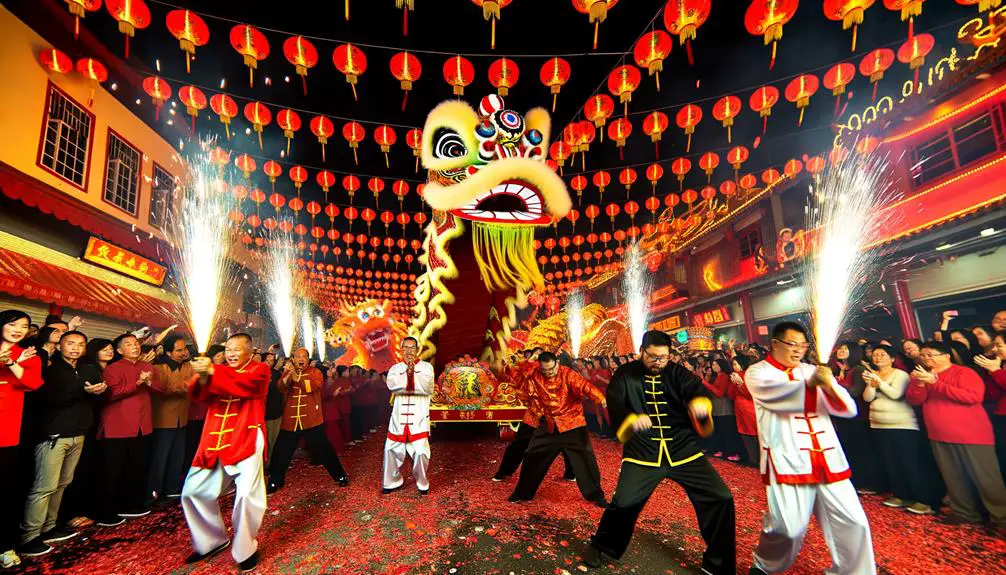
In the context of anticipated economic growth and technological innovation, the celebration of the Year of the Dragon in 2024 promises to be an exuberant fusion of traditional festivities and modern advancements. This dynamic juxtaposition can be seen in the integration of augmented reality (AR) and virtual reality (VR) in dragon dance performances, providing immersive experiences to global audiences.
Additionally, digital platforms will amplify the reach of cultural exchanges, enabling real-time participation in rituals and ceremonies. Urban centers are expected to host grand parades and fireworks displays, symbolizing prosperity and vigor.
Furthermore, the Year of the Dragon will likely inspire thematic business ventures and marketing campaigns, reflecting the dragon's attributes of strength, courage, and ambition.
Impact on Personal Life
The Year of the Dragon in 2024 is poised to greatly influence personal lives by fostering a renewed sense of ambition, strength, and innovation among individuals. This period encourages introspection and self-improvement, driving people to pursue their goals with renewed vigor.
Dragons symbolize power and resilience, prompting individuals to confront challenges head-on and transform adversity into opportunity.
Key impacts on personal life will include:
- Enhanced Motivation: Individuals will feel an increased drive to achieve their aspirations.
- Greater Confidence: The Dragon's influence will boost self-assurance, encouraging people to take bold steps.
- Creative Problem-Solving: Innovation will be at the forefront, inspiring unique approaches to personal and professional problems.
This transformative year promises significant personal growth and development.
Business and Career Opportunities
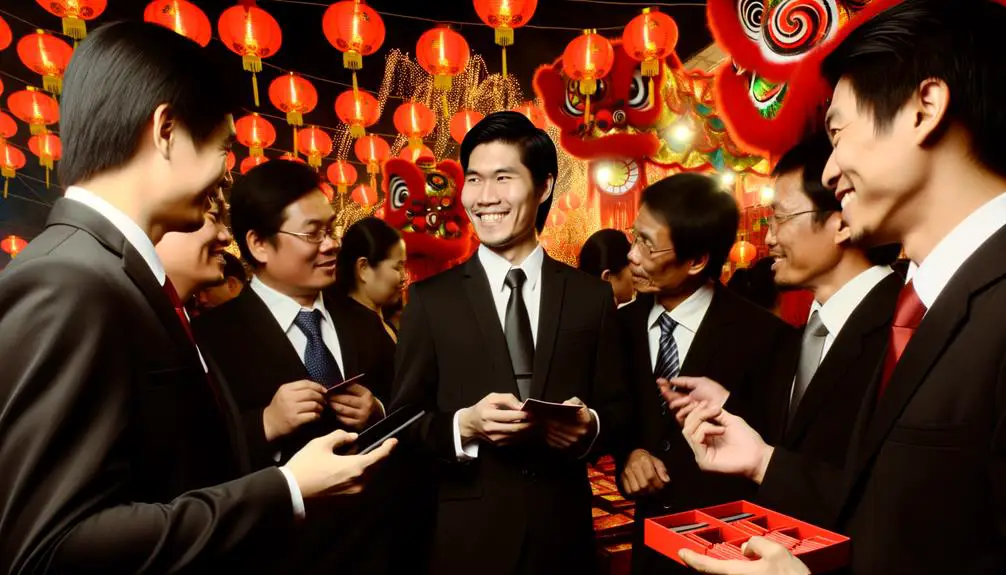
Leveraging the Dragon's dynamic energy, 2024 presents a fertile ground for business growth and career advancement, driven by heightened ambition and innovative thinking. This year, industries that prioritize innovation and technology will likely see significant gains. Professionals should focus on skill enhancement and strategic networking to capitalize on emerging opportunities.
| Sector | Opportunities |
|---|---|
| Technology | AI, cybersecurity, blockchain |
| Healthcare | Telemedicine, biotech, wellness apps |
| Finance | Fintech, digital currencies, investment |
| Renewable Energy | Solar, wind, sustainable technologies |
Companies must adapt to rapid technological changes, while individuals should seek roles that offer growth potential and skill diversification. Essentially, the Dragon's influence encourages a proactive approach, making 2024 a pivotal year for strategic advancements in business and career pursuits.
Conclusion
In summation, the Year of the Dragon in 2024 heralds a period imbued with historical gravitas and cultural symbolism. Revered for its auspicious connotations, the Dragon epitomizes strength, prosperity, and transformative potential.
Modern interpretations and traditional festivities alike will reflect this mythic creature's enduring legacy. As the celestial energies align, both individuals and enterprises are poised to navigate opportunities and challenges with renewed vigor, underscoring the Dragon's indelible impact on personal and professional landscapes.


